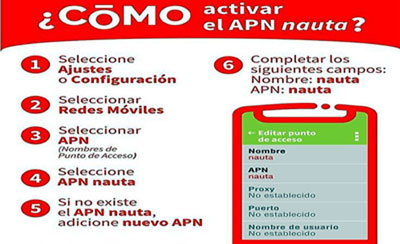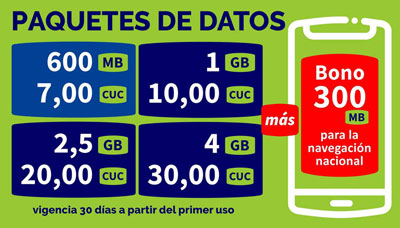Mobile Connectivity in Cuba

What to Know First About the Service
Since December 6, 2018, the mobile internet in Cuba becomes a reality. And it is not something exclusively available for companies or tourists, this time the service is available for everyone. We are not either talking about the wi-fi access in the corresponding areas, since this connectivity was already available, but we mean instead the possibility to get internet in any smartphone from any place in Cuba, including at home. And this also means you can also get internet in your computer, you just have to use a technique called tethering or simply use your smartphone as a wi-fi transmitter or hot spot. Below, we will explain how to do that.
The purpose of this page is to guide everyone interested on the mobile internet connectivity in Cuba, not only about how to configure a smartphone for a connection, but also about the available plans and packages, and also provide several tips.
Etecsa, which is the only phone company in Cuba, already provide these indications, but you have to visit several pages and even websites, in order to get a complete information. We have not found all the information about the mobile internet in Cuba one would need in a single page, therefore we have decided to write this article.
First and foremost, the service only work in smartphones supporting 3G technology, that is, the third generation cell technology, or, said in another way, which understand a frequency of 900 Mhz or superior.
- Juste send an SMS to 2266.
- In the body, write out the first digits of your IMEI code, which generally can be found under the battery of your phone. You can also get your IMEI by composing *#06# and pressing Call, which is a much better option.
- You'll receive an SMS which will say (in Spanish, obviously) whether your device supports the 900 Mhz to operate in the Cuban third generation network or an alternate message telling that it supports it.
How to get the Mobile Data Internet in Cuba
You simply need a Cuban phone SIM card. Contrary to the Nauta email service, you have not to visit an Etecsa office to ask for it, you don't have to sign or show any document. In fact, to be able to connect to the internet, you don't even need a Nauta account (something with has nothing to do with this service, even if it has the same name). Having money in the line is just enough and you just have to compose a number to request the access. If you have used the service during the free tests, you'll get it faster. Otherwise, you'll have to wait 48 hours before getting it.
- Have your APN (Access Point Name) configured (see the picture or the explanation below).
- Compose *133# and press Call.
- From the options, choose Datos (data).
- Activate the Default Tariff (Tarifa por consumo) for now.
- Hold on 48 hours to receive the available package offers.
The mi.cubacel.net Portal
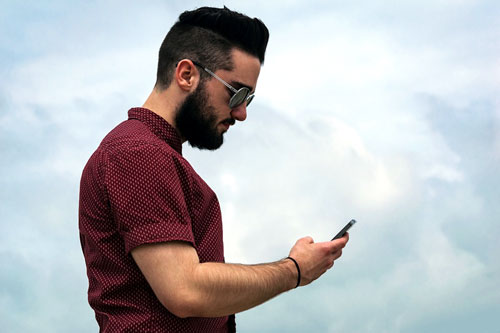
This special website was implemented specifically to manager your internet access. It will allow you to know the state of the service, for example, how many data you have used, get your balance, verify your IMEI code and getting infos about plans, expirations, buy histories and so on.
This site is special because you can access it for free, you only need the APN set up and the mobile data activated. But notice that this web site is only available in Cuba and it can only be accessed throughout a mobile data connection and not another kind of connection.
- Be sure your APN is set up.
- Activate Mobile data.
- Visit https://mi.cubacel.net from your phone.
- Sign-up to the portal.
Notice: Cubacel offers several promotions that might advantage you all along the year, where if you buy a package or if you receive an internet phone recharge, you will gain minutes, SMS or additional credit bonus. None of these bonus may be used as a credit for MMS, international calls or SMS messages or even as a fund for some internet plan purchase. You can only use your main balance (the one with real money) to get these services. Surprised?
How to Configure Your Mobile Phone to Getting Started with Data Internet
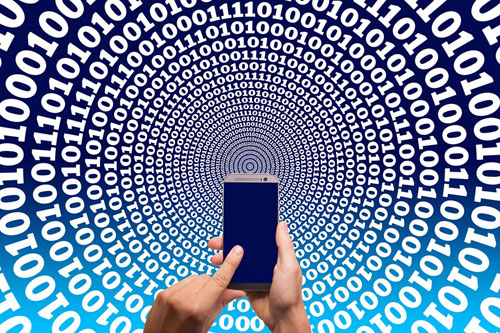
A Typical Android Configuration
To configure Android, just go to Settings > Connections > Mobile Networks > Access Point Names (assuming you have the English US language, if you have another English, it's similar), tap here, then tap Add, and configure according to the following criteria:
| Name | NAUTA |
| APN | nauta |
| APN type | default or Not set |
| MCC | 368 |
| MNC | 01 |
| APN Protocol | IPv4 |
| APN Roaming Protocol | IPv4 |
You'll probably see much more fields, but they are not required and you have not to change them in order to get the mobile data internet to work.
IPhone, Black Berry and Windows Phone Configuration
In these systems, just name "Nauta" the APN and leave blank all other fields. In case of problems call to 118 or to 5-264-2266. After the experience with the Nauta email, the data internet service has been implemented with simplicity in mind, so you have not to visit an Etecsa office. The steps may change in dependency of the system, but they are very similar.
For the IPhone, the path is Settings > Mobile Data > Mobile Data Networks. In the Black Berry go to Configuration > Network Connections > Mobile Network and then tap APN. For Windows Phone: Configuration > Mobile Data > Add Apn. In your system the paths might be slightly different (even if you are using a different version of the same system).
Tariffs and Plans
As in any other place where internet mobile data is supported, the internet is not charged by time, but by data transfer instead. In Cuba, and probably in other places as well, data transfer means both incoming and outcoming data. That is, you get charged for data you receive and you send. If you download a 50 kb image and you perform a 16 kb request, you would spend a total of 66 kb of data. Obviously, there is also national navigation, that is, the web sites with .cu domain, such as www.etecsa.cu for example. This national navigation costs less (0.02 CUC per megabyte) and it exists even a plan for it. National navigation is also included when you purchase in internet package. But, as Etecsa explains, you may get involved with mixed connections. A Cuban web site may use internet contents which are automatically downloaded, or even the operating system of your phone may be involved in an automatic update. It's also possible that a web site you are visiting is using a remote API, such as the Google API and there are many other variants.
Plans and their features are subject to change over the time and it is possible that when you arrive there, they might already have changed. Therefore we will just say that at the beginning, that is on December 6 2018, the tariff were:
- Default tariff or "pay as you go" (10 cents per megabyte).
- 600 mb Package, 7 cucs.
- 1 Gb Package, 10 cucs.
- 2.5 Gb Package, 20 cucs.
- 4 Gb Package, 30 cucs.
All the packages are supposed to include 300 mb of national navigation, and when the default tariff applies we remind that it is 0.02 cucs per megabytes.
At the time of writing this article, plans have a duration of 30 days, that means that data corresponding to this tariff must be used before its expiration, or you will lose it. Whereas the default tariff is only limited to the available funds in your cellular phone line. Also, the purchased data may not be transferred to another account or person, at least at the time being. We will update in this article any future change at our best.
The data services of Etecsa are spent according to this order of priority:
- Promotional bonus offered by a purchased package of data and which is being used. This would be the first service spent, whenever an active promotional bonus exists (there are none in the initial packages).
- The second thing that is spent, after the bonus, is the Mail Purse package (Bolsa de Correo), that is, the Nauta email tariff has priority over the internet one, if you are checking your mail and you have an email plan in use, then it will be spent first. This apply only if you have an active Nauta account.
- A data package according to the purchased plan, for example, if you got the 1 GB plan, this will be the first thing spent, unless you have an active (and in use) Nauta email package or you have any active promotional bonus in use.
- The main balance of your phone, no matter the bonus associated with that balance. That is, if you have a main balance of 20 cucs and an extra 30 cucs bonus (a typical situation), the data usage is deduced from your 20 cucs (don't confuse the phone bonus with internet bonuses, they are not the same thing). Instead, if your default tariff is disabled (strongly suggested), when you finish your package you may not generate any more traffic until you buy another package again, and this is the best scenario for most users.
If you buy a new package while you still have another in use, they will sum together at the first connection and, sure, the oldest will be the first which will be spent. While the limit date to spend all the data will be the one corresponding to the last purchased package. Before the first connection, you will not be able to see your balance composing the *133#.
Get your Laptop or Tablet Connected Using Your Cell Phone
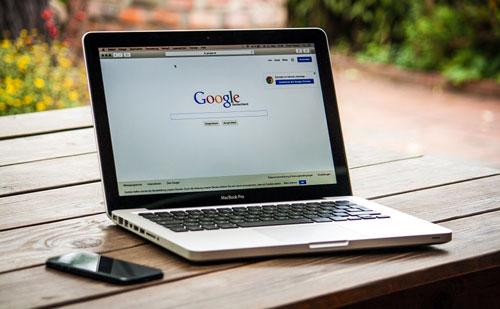
Here, we will assume that you want to get connected with a computer, no matter if you have la laptop or desktop or even a table. It works with all of them. We'll also assume that your system run under Windows (in Linux or Mac it works almost the same way).
There are several ways to share your mobile connection, one way is to use the tethering technique, that is, using your cell phone as a modem and connect it to your computer with a usb cable or bluetooth.
Nevertheless, the simplest way is simply to set your mobile as a hot spot and connect to it as it was your cyber coffee wi-fi connection.
In an Android 6 environment, just go to Settings > Connections > Mobile Hot Spot and Tethering, tap there, then "Mobile Hot Spot" and then activate it. You'll also find there the password you need to connect to that hot spot. You can also do that form your cell phone quick settings.
The step to set up the Hot Spot may be different in another version of Adroid or under Windows Phone or iOS, but they are very similar, you'll always have to adjust network settings and find the corresponding options. In case of doubts, check the online help of your operating system or find some tutorial (or video) in the internet which will discuss your specific system.
Some people claim that the Hot Spot option is expensive in terms of data and drains a lot of megabytes, but this is probably a rumor or misconception. This kind of connection doesn't have to drain more data than expected, except the fact you are using two systems and your computer might have some software updating itself from the internet automatically. This is the only reason of which a data usage might be greater.
Tips for a Better Use of Mobile Connection

- Avoid the default tariff, the one that costs 10 cents per Mb of data, because it will be 10 times more expensive than the 1 GB plan. In fact, if you generate one gigabyte of data using the default tariff, you would have to pay 102.40 cucs deduced from your main balance, assuming you have the funds in your phone. Therefore, once you purchase a given plan, you must deactivate the default tariff, so whether you run out of your package, you will not be drained 10x more from your main balance. Just take into account that the sole fact to connect to the Google Play home page without download anything or doing anything else, will spend 15 Mb. Deactivate the default tariff. There are people that got drained out of 200 cucs or more in an eye blink. To disable the default plan, just compose *133#, chose Data and deactivate it.
- Disable mobile data when you don't need it. When you are not connected to the internet or you are not checking email, you should deactivate mobile data, because, even if you do nothing, there is always a little traffic, which will also drain from your balance, this happens even if you don't have internet, even if you don't have any Nauta account!
- Use the lite versions of the social media. For example, Facebook features an application with a lite version where data transfer is reduced and saved. In general, avoid social media when you connect with mobile data internet.
- Don't allow automatic updated neither from your phone nor from your computer, if you use it. You must always check which components of your devices are accessing the internet and why.
- Avoid applications such as Whatsapp or Imo. Since these services drain large data amounts, use them only when you get connected through normal wi-fi or Nauta Hogar (the ADSL in Cuba) connections and not by data mobile internet. The same thing applies with Youtube or any other intensive website or application involving sounds, lot of images or videos.
There are applications such as Datally or My Data Manager which allow to measure the data traffic and which applications spend more of it.
Conclusion
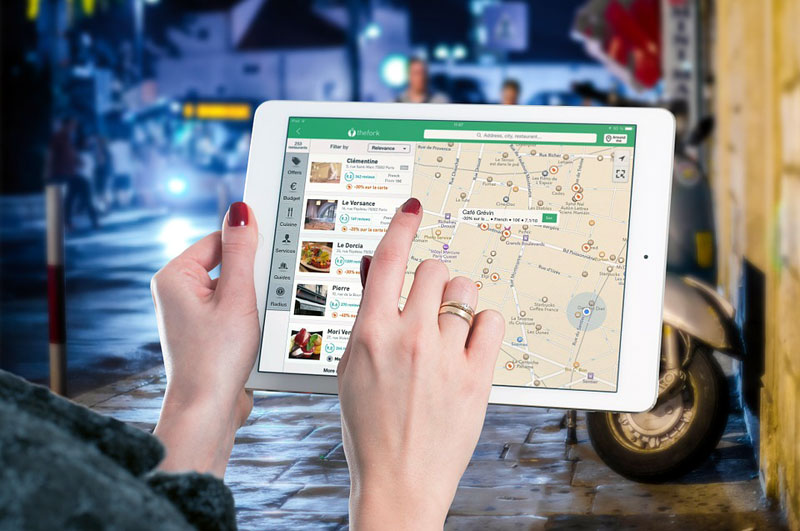
Definitively the internet mobile data offer in Cuba represents a sure progress, but this is not enough to say that Cuban finally are connected. What society and government no longer forbid, is forbidden by the prices and the result is almost the same.
At the time of writing of this article, that is on December 2018, none of the existing tariffs represent a realistic or practical option for the average guy. We are no longer in the 1990s and big sites like Facebook and Youtube drain huge quantities of data, a quantity that goes out of any control, and we are no talking about communication apps such as IMO or Whats App. We tested that 10 minutes IMO call at the default tariff would be more expensive than a direct, phone international call. Even using a plan, if I use the internet as I do when I get connected throughout a wi-fi connection, the 1 GB plan would no last 2 days and it would never comparable with the 10 hours I would get by recharging my Nauta account and connect in a park or hotel.
The current prices are out of any practical application. Officially anybody may have internet in Cuba now. But, even for those that can afford it, up to what it would be convenient? We hope that the situation will change in the future, this article will not remain as is, it will be updated as the internet situation in Cuba would evolve. The Nauta Hogar solution, which is the broadband internet at home, has still not been implemented in most places and it is not an option. It is still exclusively reserved to hotels and companies. The day it would be more widely available, we will be glad to write an article about it.







